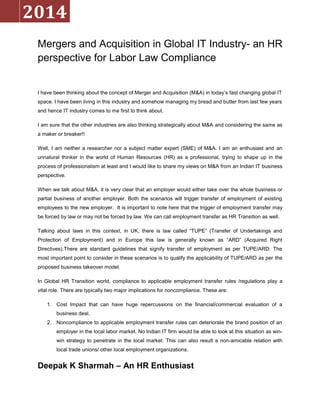Mergers and Acquisition in Global IT industry
- 1. Mergers and Acquisition in Global IT Industry- an HR perspective for Labor Law Compliance I have been thinking about the concept of Merger and Acquisition (M&A) in todayŌĆÖs fast changing global IT space. I have been living in this industry and somehow managing my bread and butter from last few years and hence IT industry comes to me first to think about. I am sure that the other industries are also thinking strategically about M&A and considering the same as a maker or breaker!! Well, I am neither a researcher nor a subject matter expert (SME) of M&A. I am an enthusiast and an unnatural thinker in the world of Human Resources (HR) as a professional, trying to shape up in the process of professionalism at least and I would like to share my views on M&A from an Indian IT business perspective. When we talk about M&A, it is very clear that an employer would either take over the whole business or partial business of another employer. Both the scenarios will trigger transfer of employment of existing employees to the new employer. It is important to note here that the trigger of employment transfer may be forced by law or may not be forced by law. We can call employment transfer as HR Transition as well. Talking about laws in this context, in UK, there is law called ŌĆ£TUPEŌĆØ (Transfer of Undertakings and Protection of Employment) and in Europe this law is generally known as ŌĆ£ARDŌĆØ (Acquired Right Directives).There are standard guidelines that signify transfer of employment as per TUPE/ARD. The most important point to consider in these scenarios is to qualify the applicability of TUPE/ARD as per the proposed business takeover model. In Global HR Transition world, compliance to applicable employment transfer rules /regulations play a vital role. There are typically two major implications for noncompliance. These are: 1. Cost Impact that can have huge repercussions on the financial/commercial evaluation of a business deal. 2. Noncompliance to applicable employment transfer rules can deteriorate the brand position of an employer in the local labor market. No Indian IT firm would be able to look at this situation as win- win strategy to penetrate in the local market. This can also result a non-amicable relation with local trade unions/ other local employment organizations. Deepak K Sharmah ŌĆō An HR Enthusiast 2014

